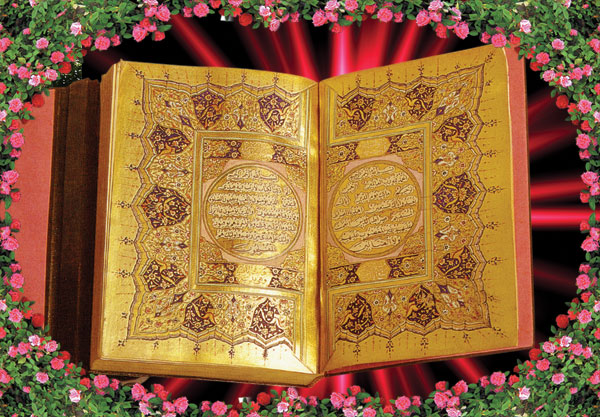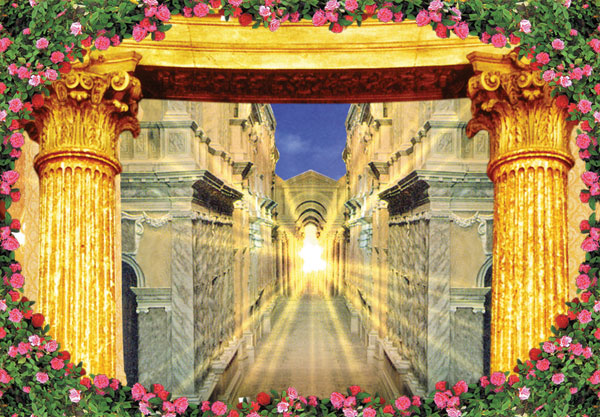As Allah makes clear in the verse: "So call and go straight as you have been ordered to…" (Surat ash-Shura: 15), the Prophet Muhammad (saas) was the last prophet charged with warning mankind. Like all the other messengers, the Prophet (saas) called people to the true path, to have faith in Allah, to live for the hereafter and to exercise good morality. The methods he employed, the way he explained things, and the style he used must remain examples for all Muslims, and when a Muslim invites people to the religion he must speak and behave in the manner of the Prophet (saas).
This is how it is revealed in the Qur'an that the Prophet (saas) was commanded to say that he had come to warn mankind:
Say: "This is my way. I call to Allah with inner sight, I and all who follow me. Glory be to Allah! I am not one of the idolaters!" (Surah Yusuf: 108)
The Prophet (saas) did all that he could and more to warn people, and extended great effort to address as many people as he could. Allah reveals in one verse:
Say: "What thing is greatest as a witness?" Say: "Allah. He is Witness between me and you. This Qur'an has been revealed to me so that I may warn you by it, and anyone else it reaches. Do you then bear witness that there are other gods together with Allah?" Say: "I do not bear witness." Say: "He is only One God, and I am free of all you associate with Him." (Surat al-An'am: 19)
 |
O man! what has deluded you in respect of your Noble Lord? |
By communicating the message of the Qur'an, the Prophet (saas) completely abolished the corrupt religions that the polytheists had inherited from their ancestors, for which reason he met with much resistance. Yet, he abided by Allah's command and took no notice of their oppression and animosity. Allah commands the Prophet (saas) thus in one verse:
Proclaim what you have been ordered to and turn away from the idolaters. We are enough for you against the mockers. (Surat al-Hijr: 94-95)
Muslims in our own time too must explain the morality of the Qur'an to people, ignoring any lack of approval and whatever anyone might say to oppose them. They must not fear "the blame of any blamer," as the Prophet (saas) did. That is a sign of morality and godliness that will be rewarded with Paradise. The Prophet (saas) commanded Muslims to abide by that Sunnah in these words, "Convey my teaching to the people even if it were a single sentence."35
In order that people should appreciate the power of Allah and adopt a nobler morality out of awe of Him, the Prophet (saas) used to tell people of the might of Allah and of the proofs of the splendour in His creation. He thus became the means whereby they would love Allah and fear him. This verse describes how the Prophet (saas) was commanded to speak:
Say: "What do you think? If Allah made it permanent night for you till the Day of Resurrection, what god is there other than Allah to bring you light? Do you not then hear?" Say: "What do you think? If Allah made it permanent day for you till the Day of Resurrection, what god is there other than Allah to bring you night to rest in? Do you not then see?" (Surat al-Qasas: 71-72)
 |
Ismail Hakki Altunbezer. A Qur'anic verse in celi thuluth script: "Allah has power over all things." (Surat al-Baqara: 20) |
The Prophet Muhammad (saas) also spoke of the proofs of Allah's creation to those who did not believe in the hereafter, and explained that Allah, Who has the power to create them, also had the power to create the same again in the hereafter. Allah states in the verse in question as thus:
Say: "Travel about the earth and see how He brought creation out of nothing. Then later Allah will bring about the next existence. Allah has power over all things." (Surat al-'Ankabut: 20)
These are some of the verses in which the Prophet (saas) is told in which way to communicate how Allah is exalted above anything they associate with Him and has no need of anything:
Say: "Am I to take anyone other than Allah as my Protector, the Bringer into Being of the heavens and the earth, He who feeds and is not fed?" Say: "I am commanded to be the first of the Muslims," and, "Do not be among the idolaters." Say: "I fear, were I to disobey my Lord, the punishment of a dreadful Day." (Surat al-An'am: 14-15)
In the Qur'an, the Prophet (saas) was also told how to explain that there is no god but Allah and that our Lord is the Lord of all:
Say: "Who is the Lord of the heavens and the earth?" Say: "Allah." Say: "So why have you taken protectors apart from Him Who possess no power to help or harm themselves?" Say: "Are the blind and seeing equal? Or are darkness and light the same? Or have they assigned partners to Allah Who creates as He creates, so that all creating seems the same to them?" Say: "Allah is the Creator of everything. He is the One, the All-Conquering." (Surat ar-Ra'd: 16)
The Prophet (saas) made his community, who knew that Allah existed but did not consider His infinite might and were thus unable to appreciate His existence, and acknowledge His power. After that, he called on them to take warning. The verses in question are as follows:
Say: "To whom does the earth belong, and everyone in it, if you have any knowledge?" They will say: "To Allah." Say: "So will you not pay heed?" Say: "Who is the Lord of the Seven Heavens and the Lord of the Mighty Throne?" They will say: "Allah." Say: "So will you not do your duty [by Him]?" Say: "In Whose hand is the dominion over everything, He Who gives protection and from Whom no protection can be given, if you have any knowledge?" They will say: "Allah's." Say: "So how have you been bewitched?" (Surat al-Muminun: 84-89)
Some people choose errant paths for themselves that are full of errors, superstition and harmful ideas and methods. These can bring them nothing but loss in this world and the next. The Prophet (saas) was always at pains to call people to the best and most beautiful path, the path of Allah, and to be a means whereby people could be saved in this world and the next.
Say: "Are we to call on something besides Allah which can neither help nor harm us, and to turn on our heels after Allah has guided us, like someone the satans have lured away in the earth, leaving him confused and stupefied, despite the fact that he has companions calling him to guidance, saying, 'Come with us'!" Say: "Allah's guidance, that is true guidance. We are commanded to submit as Muslims to the Lord of all the worlds." (Surat al-An'am: 71)
The Prophet (saas) has stated in the hadiths that the right path is that of Allah and His Prophet (saas):
"The best word is the Word of Allah and the best guidance is the guidance of Muhammad."36
 |
Is there another god besides Allah? Say: |
One of the most important errors that the Prophet (saas) has warned against is associating partners with Allah (shirk). As can be seen from the verses of the Qur'an, the Prophet (saas) always told people that Allah is the only God, that nothing had any power apart from Allah, and warned them against idolatry. He was commanded to do this in many verses, some of which read:
Say: "This is my way. I call to Allah with inner sight, I and all who follow me. Glory be to Allah! I am not one of the idolaters!" (Surah Yusuf: 108)
Say: "I call only upon my Lord and do not associate anyone else with Him." Say: "I possess no power to do you harm or to guide you right." Say: "No one can protect me from Allah [if I should disobey] and I will never find any refuge apart from Him." (Surat al-Jinn: 20-22)
Say: "I am commanded to worship Allah, making my religion sincerely His. And I am commanded to be the first of the Muslims." Say: "I fear, were I to disobey my Lord, the punishment of a terrible day." Say: "It is Allah I worship, making my religion sincerely His, so worship anything you will apart from Him!" Say: "The real losers are those who lose themselves and their families on the Day of Resurrection." Is not that clear loss? (Surat az-Zumar: 11-15)
He Who originates creation and then regenerates it and provides for you from out of heaven and earth. Is there another god besides Allah? Say: "Bring your proof if you are being truthful." (Surat an-Naml: 64)
 |
Mustafa Rakim Efendi. 1797. "I declare Allah to be morally perfect and thank Him. There is no god but Him. He is the mightiest, and there is no power but Allah." |
The Prophet (saas), who reminded his people that Allah is the only God, also told them that nothing they might set up alongside Allah could ever create anything nor had it any power to harm or benefit any. The verses regarding this are as follows:
Say: "Call on those you make claims for apart from Him. They possess no power to remove any harm from you or to change anything." (Surat al-Isra': 56)
Say: "Have you thought about those you call upon apart from Allah? Show me what they have created on the earth. Or do they have a partnership in the heavens? Produce a Book for me before this one or a shred of knowledge if you are telling the truth." (Surat al-Ahqaf: 4)
Say: "Call on those you make claims for besides Allah. They have no power over even the smallest particle, either in the heavens or in the earth. They have no share in them. He has no need of their support." (Surah Saba': 22)
Say: "Have you thought about your partner gods, those you call upon besides Allah? Show me what they have created of the earth; or do they have a partnership in the heavens?" Have We given them a Book whose Clear Signs they follow? No indeed! The wrongdoers promise each other nothing but delusion. (Surah Fatir: 40)
Most people believe in Allah but are unable to appreciate His power and greatness, fail to comprehend that He is their only friend and helper, and wrongly believe that things other than Allah can be of assistance to them. The Prophet (saas) explained these truths to his people and attempted to free them from idolatry. He is commanded in the verses:
If you ask them, "Who created the heavens and the earth?" They will say, "Allah." Say: "So what do you think? If Allah desires harm for me, can those you call upon besides Allah remove His harm? Or if He desires mercy for me, can they withhold His mercy?" Say: "Allah is enough for me. All those who truly trust put their trust in Him." (Surat az-Zumar: 38)
Say: "Who is going to shield you from Allah if He desires evil for you or desires mercy for you?" They will find no one to protect or help them besides Allah. (Surat al-Ahzab: 17)
Allah created man, and is his only friend and helper. Yet, people who have no fear of Him refuse to accept that. Only in times of difficulty, when something happens to clearly show them how helpless they are, do they understand that only Allah can help them. The Prophet (saas) also reminded people of that same fact. He said that in times of trouble or loss people have no other helper than Allah. The Prophet (saas) is called upon to remind people of that in the Qur'an:
Say: "What do you think? If Allah's punishment were to come upon you or the Hour, would you call on other than Allah if you are being truthful?" It is Him you call on and, if He wills, He will deliver you from whatever it was that made you call on Him; and you will forget what you associated with Him. (Surat al-An'am: 40-41)
Believers who remember that truth emphasized by the Prophet (saas) know, without having to experience such difficulties, that only Allah can ever help them, and that only He has the power to lift their troubles and burdens. In the Qur'an, Allah says:
Say: "Who rescues you from the darkness of the land and sea? You call on Him humbly and secretly: 'If you rescue us from this, we will truly be among the thankful.'" Say: "Allah rescues you from it, and from every plight. Then you associate others with Him." (Surat al-An'am: 63-64)
The Prophet (saas) has warned all Muslims against idolatry in the hadiths:
"The most severe sin is to associate partners with Allah (known as shirk), while He has created you."37
Elsewhere, the Prophet (saas) stated that not associating others with Allah is both the proof as well as the necessary condition of faith:
"Whoever meets Allah, without associating partners with Him, will enter Paradise."38
He also stressed what a great hidden danger idolatry is:
"Should I not inform you of that which I fear for you even more than the dangers of dajjal? It is the hidden idolatry: A person stands to pray and he beautifies his prayer because he sees the people looking at him."39
"Idolatry is more hidden in my Ummah than the creeping of ants across a great smooth stone on a black night..."40
 |
Say: ‘No one in the heavens and the earth knows the Unseen except Allah.’ They are not aware of when they will be raised. |
The word "ghaib" in the Qur'an is used for hidden things that man cannot see or know. Things that will happen in the future are unknown to us, for instance. Yet everything to do with the future, the future of every individual, country, building and piece of furniture, is known to Allah. This is how the Prophet (saas) was told to explain that knowledge of the invisible (ilm-ul-ghaib) lies solely with Allah:
 |
The first original text of the Qur'an (Surat al-Qadr) is exhibited in the Archives Department of Topkapi Palace in Istanbul. |
Say: "Allah knows best how long they stayed. The Unseen of the heavens and the earth belongs to Him. How perfectly He sees, how well He hears! They have no protector apart from Him. Nor does He share His rule with anyone." (Surat al-Kahf: 26)
Say: "No one in the heavens and the earth knows the Unseen except Allah." They are not aware of when they will be raised. (Surat an-Naml: 65)
Say: "My Lord hurls forth the Truth—the Knower of all unseen things." (Surah Saba': 48)
When asked about the unseen from time to time, our Prophet (saas) would give the following answer:
"I do not know. I am a servant; all I know is what my Lord reveals. I cannot know what He does not reveal ..." (Abdul-Rahman al-Jami, Nafahat al-Uns, translated into Turkish by Abdulkadir Akcicek, Istanbul, 1981, p. 325)
However, it is also a fact revealed in verses that Allah does impart knowledge of the unseen to those servants He chooses. He reveals in one verse that:
He is the Knower of the Unseen, and does not divulge His Unseen to anyone. Except a Messenger with whom He is well pleased ... (Surat al-Jinn: 26-27)
In another verse, Allah reveals that He has bestowed news from the unseen on our Prophet (saas):
This is news from the unseen which We reveal to you… (Surah Al 'Imran: 44)
Indeed, Allah blessed the Prophet (saas) with much knowledge of the future, and these things have all come about, just as our Prophet (saas) said they would.
Some people think that when they intend to do something wrong, or plan a wicked act with others of like-mind, or gossip, they can conceal it from others. However, Allah knows everything an individual thinks, what enters his mind, what two people whisper to each other, and everything in heaven and earth. He witnesses everything a person does. Every individual will have to offer account in the hereafter for everything he thought he had done or said in secret. That person may perhaps forget those words full of wickedness, but Allah will place everything he has forgotten before him on the Day of Judgment.
The Prophet (saas) also drew attention to that fact, and warned people they would have to give account of themselves. These are some of the verses on the subject:
Say, "Whether you conceal what is in your breasts or make it known, Allah knows it. He knows what is in the heavens and what is on earth. Allah has power over all things." (Surah Al 'Imran: 29)
Say: "Allah is a sufficient witness between me and you. He is certainly aware of and sees His servants." (Surat al-Isra': 96)
If they turn their backs, then say: "I have informed all of you equally and I do not know if what you have been promised is near or far. He knows what is said openly and He knows what you hide." (Surat al-Anbiya': 109-110)
Say: "Do you presume to teach Allah your religion when Allah knows everything in the heavens and everything in the earth? Allah has knowledge of all things." (Surat al-Hujurat: 16)
During and after the time of the Prophet (saas) there have been those who denied that the Qur'an is a Divine book. Some of these people even went so far as to claim it was the Prophet (saas) himself who had written it. Yet, it is evident that the Qur'an was not written by any human hand. The Qur'an is the word of Allah, and contains many miracles and is a superior wisdom, the like of which no human being could ever conceive. The Prophet (saas) reminded people of this, and announced that the Qur'an had been sent by Allah. These are some of the verses that refer to this:
Say: "The One Who sent it down is He Who knows all hidden secrets in the heavens and earth. He is Ever-Forgiving, Most Merciful." (Surat al-Furqan: 6)
Say: "What do you think? If it is from Allah and you reject it, who could be more misguided than someone entrenched in hostility to it?" (Surah Fussilat: 52)
 |
The revelation of the Book is from Allah, the Almighty, the All-Wise. … This is a Book We have sent down to you so that you can bring mankind from the darkness to the light, by the permission of their Lord, to the Path of the Almighty, the Praiseworthy. |
Those who allege that the Qur'an was written by a human being are unaware of the miracles it contains and that its wisdom is from Allah. In fact, the Qur'an is such a book that not even all the people in the world and all the jinn together could have written it, let alone one man. The Prophet (saas) was commanded to say the following on the subject:
Say: "If both men and jinn banded together to produce the like of this Qur'an, they could never produce anything like it, even if they backed each other up." (Surat al-Isra': 88)
Do they say, "He has invented it?" Say: "Then produce a sura like it and call on anyone you can besides Allah if you are telling the truth." (Surah Yunus: 38)
In another hadith, the Prophet (saas) stated that the Qur'an was the word of Allah:
"Honesty descended from the Heavens and settled in the roots of the hearts of men (faithful believers), and then the Qur'an was revealed and the people read the Qur'an, (and learned from it) and also learned it from the Sunnah. Both Qur'an and Sunnah strengthened their (the faithful believers') honesty."41
The Prophet (saas) said that the Qur'an led people to the true path, and advised people to take it as their guide. Some of the verses on that subject are:
Say: "The Purest Spirit has brought it down from your Lord with truth, to make those who believe firm, and as guidance and good news for the Muslims." (Surat an-Nahl: 102)
Say: "If I am misguided, it is only to my detriment. But if I am guided, it is by what my Lord reveals to me. He is All-Hearing, Close-at-hand." (Surah Saba': 50)
This is why the Prophet (saas) placed great importance in teaching the Qur'an:
"Acquire the knowledge and impart it to the people. Learn the Qur'an and teach it to the people; for I am a person who has to depart this world."42
One of the errant beliefs prevalent in ignorant societies is that one person's sins can be heaped upon another. For example, someone may try to prevent his friends from carrying out a religious obligation and say, "I will accept that sin myself." Of course that person will be committing the sin of preventing the carrying out of an obligation, but his friend will still be committing the sin of not carrying it out. In other words, nobody can lift that sin from another's shoulders. On the Day of Reckoning, people will only be held responsible for their own deeds. Nobody will be asked about the sins of others, and nobody's sins will be attributed to anyone else. Allah told the Prophet Muhammad (saas) to explain this in these terms:
Say: "Am I to desire other than Allah as Lord when He is the Lord of all things?" What each self earns is for itself alone. No burden-bearer can bear another's burden. Then you will return to your Lord, and He will inform you regarding the things about which you differed. (Surat al-An'am: 164)
 |
The Prophet is closer to the believers than their own selves... |
The Prophet's (saas) words, "no burdened soul will bear another's burden," 43 explained the truth about that popular superstition.
All through history, societies that have opposed Allah, his messengers and religion, have been destroyed by great disasters, in such a way as to leave no trace of them. The end of such societies must be a lesson for all people, to turn to Allah and fear His wrath.
Say: "Travel about the earth and see the final fate of the evildoers." (Surat an-Naml: 69)
Say: "Travel about the earth and see the final fate of the deniers." (Surat al-An'am: 11)
Say: "Travel about the earth and see the final fate of those before. Most of them were idolaters." (Surat ar-Rum: 42)
One thing the Prophet (saas) said in the light of the above verses was "Rejoice and hope for what will please you! By Allah, I am not afraid of your poverty but I am afraid that you will lead a life of luxury as past nations did, whereupon you will compete with each other for it, as they competed for it, and it will destroy you as it destroyed them." 44by which he warned people of the disasters that had come upon others because of their indulgence.
 |
We destroyed the cities round about you and have variegated the Signs so that hopefully they will turn back. |
Dying is one of the foremost fears of those who doubt or do not believe in the hereafter. Since they believe that death will mean the end of everything, they therefore cling desperately to this world. Yet, everyone will die at the moment decreed for him by Allah, and there is no means of escape from it. The Prophet (saas) also told people that there was nothing to be gained by trying to avoid death, and called on them instead to consider their real life, which comes after.
Say: "Flight will not benefit you if you try to run away from death or being killed. Then you will only enjoy a short respite." (Surat al-Ahzab: 16)
Say: "You have a promised appointment on a Day which you cannot delay or advance a single hour." (Surah Saba': 30)
The Prophet (saas) recommended to people they think about death, and said:
"Those who are most aware of death and prepare themselves for it. They are the wisest of people."45
 |
Who is better: someone who founds his building on heeding and pleasing Allah, or someone who founds his building on the brink of a crumbling precipice so that it collapses with him into the Fire of Hell? Allah does not love wrongdoers. |
One of people's main concerns is the time and the hour of the Day of Judgment. Allah has revealed that none but He can know of it:
People will ask you about the Last Hour. Say: "Only Allah has knowledge of it. What will make you understand? It may be that the Last Hour is very near." (Surat al-Ahzab: 63)
As revealed in the verse, nobody can have knowledge of the Last Hour unless Allah wills otherwise. However, one can make an estimate as to its century based on the hadiths of the Prophet (saas) and signs in the Qur'an, and say "the Last Hour may come when there are no believers left and disbelief reigns." As a matter of fact, the great Ahl al-Sunnah scholars al-Barzanji and as-Suyuti state, based on the hadiths of the Prophet (saas), that the life span of the Ummah will not exceed the Islamic year 1500, in other words it will end before Islamic 1600s. Bediuzzaman Said Nursi says, again according to the information given in the hadiths, that Muslims will remain on Allah's true path and will be victorious until around Islamic year 1506 with the Last Hour probably taking place in 1545 (2120 according to the Gregorian calendar). (Allah knows the truth.) (For detailed information on the subject, see www.awaitedmahdi.com)
One very common superstition in ignorant societies is that people will remain in Hell for a given length of time and then leave it. However, Allah has made it known that some people will remain in Hell for ever. In accordance with Allah's command, the Prophet (saas) told those who believed that one will only remain in Hell for a given period that some people will stay there permanently:
They say, "The Fire will only touch us for a number of days." Say, "Have you made a contract with Allah—then Allah will not break His contract—or are you rather saying about Allah what you do not know?" No indeed! Those who accumulate bad actions and are surrounded by their mistakes, such people are the Companions of the Fire, remaining in it timelessly, for ever; whereas those who believe and do right actions, such people are the Companions of the Garden, remaining in it timelessly, for ever. (Surat al-Baqara: 80-82)
 |
We made them leaders, guiding by Our command, and revealed to them how to do good actions and establish prayer (salat) and pay the welfare tax (zakat), and they worshipped Us. |
The Prophet (saas) also had this to say about life in Heaven and Hell:
"When the inmates of Paradise would go to Paradise and the inmates of Hell would go to Hell, death would be called and it would be placed between the Paradise and the Hell and then slaughtered and then the announcer would announce: inmates of Paradise, no death; Inmates of Hell-Fire, no death. And it would increase the delight of the inmates of Paradise and it would increase the grief of the inmates of Hell-Fire."46
As we have seen earlier, the Prophet (saas) would call on Allah by His most beautiful names when communicating or explaining anything and when praying. The Prophet (saas) was told to invite people to do the same:
Say: "Call on Allah or call on the All-Merciful, whichever you call upon, the Most Beautiful Names are His." Do not be too loud in your prayer [salat] or too quiet in it, but try to find a way between the two. And say: "Praise be to Allah Who has had no son and Who has no partner in His Kingdom and Who needs no one to protect Him from abasement." And proclaim His Greatness repeatedly! (Surat al-Isra': 110-111)
Again, in accordance with Allah's command, the Prophet (saas) revealed that we should not discriminate between the prophets sent by Allah, and in one hadith, said, "Don't give superiority to any prophet amongst Allah's prophets." 47All of the prophets were loved and trusted by Allah, and were blessed godly people rewarded with Paradise. All of the prophets taught the religion of Allah, and like the Prophet Muhammad (saas), called all those they could reach to the way of Allah. That is a most important aspect of the actions of the Prophet (saas), a matter which appears in the Qur'an in this form:
Say, "We believe in Allah and what has been sent down to us and what was sent down to Abraham, Ishmael and Isaac and Jacob and the Tribes, and what Moses and Jesus and all the prophets were given by their Lord. We do not differentiate between any of them. We are Muslims submitted to Him." (Surah Al 'Imran: 84)
Say, "We believe in Allah and what has been sent down to us and what was sent down to Abraham_and Ishmael and Isaac and Jacob and the Tribes, and what Moses and Jesus were given, and what all the prophets were given by their Lord. We do not differentiate between any of them. We are Muslims submitted to Him." (Surat al-Baqara: 136)
As has been recounted throughout this book, the Prophet (saas) possessed a morality that is a model for the whole world, he called on others to conform to that morality, and described what kind of morality and behavior would be pleasing to Allah. Some verses on the subject read:
Say: "Come and I will recite to you what your Lord has forbidden: that you do not associate anything with Him; that you are good to your parents; that you do not kill your children because of poverty—We will provide for you and them; that you do not approach indecency—outward or inward; that you do not kill any person Allah has made inviolate—except with the right to do so. That is what He instructs you to do so that hopefully you will use your intellect. And that you do not go near the property of orphans before they reach maturity—except in a good way; that you give full measure and full weight with justice—We impose on no self any more than it can bear; that you are equitable when you speak—even if a near relative is concerned; and that you fulfil Allah's contract. That is what He instructs you to do, so that hopefully you will pay heed. (Surat al-An'am: 151-152)
Say: "My Lord has forbidden indecency, both open and hidden, and wrong action, and unrightful tyranny, and associating anything with Allah for which He has sent down no authority, and saying things about Allah you do not know." (Surat al-A'raf: 33)
 |
We only sent you for the whole of mankind, bringing good news and giving warning. But most of mankind do not know it. |
The following are some of the hadiths in which the Prophet (saas) recommends such a morality:
"My Cherisher has ordered me nine things: To reverence Him, externally and internally; to speak true, and with propriety, in prosperity and adversity; moderation in affluence and poverty; to benefit my relations and kindred who do not benefit me; to give alms to him who refuses me; to forgive him who injures me; that my silence should be in attaining knowledge of Allah; that when I speak, I should mention Him; that when I look on Allah's creatures, it should be as an example for them."48
"Do not envy one another; do not hate one another; do not turn away from another; and do not undercut one another, but be you. O servants of Allah, brothers."49
"Fear Allah wherever you are, and follow up a bad deed with a good one and it will wipe it out, and behave well towards people."50
"There is nothing heavier in the scales than good character."51
The Prophet (saas) made the following recommendations to his companions:
"Bad conduct destroys Divine service as condiment destroys honey."52
"Honour a believer for his religion. Think him superior for good conduct and wisdom."53
The Prophet (saas) stated that pride and arrogance were examples of poor morality, and that arrogant people would be repaid in Hell. He warned them against that danger. With his humility, modesty, affection and caring disposition in all situations, the Prophet (saas) was the best possible role-model.
These are some of the Prophet's (saas) warnings with regards to arrogance:
"Verily, Allah is Graceful and He loves Grace. Pride is disdaining the truth (out of self-conceit) and contempt for the people."54
"Arrogance means ridiculing and rejecting the Truth and despising people."55
The Prophet (saas) warned those who boasted of their families and ancestry, thus becoming arrogant, saying:
"Allah, Most High, has removed from you the pride of the pre-Islamic period and its boasting in ancestors. One is only a pious believer or a miserable sinner. You are sons of Adam, and Adam came from dust. Let the people cease to boast about their ancestors. They are merely fuel in Hell; or they will certainly be of less account with Allah than the beetle which rolls dung with its nose."56
 |
The metaphor of those who spend their wealth in the Way of Allah is that of a grain which produces seven ears; in every ear there are a hundred grains. Allah gives such multiplied increase to whoever He wills. Allah is All-Encompassing,All-Knowing. |
The Prophet (saas) recommended to his followers to always dress well and to be pleasant in appearance and to look well cared for. At the same time, however, he also reminded them that those who grew proud because of the clothes they wore or the way they looked would be humiliated in this world and in the next. He told them to always be humble. Here is what he said on the subject:
"While a man was walking, clad in a two-piece garment and proud of himself with his hair well-combed, suddenly Allah made him sink into the earth and he will go on sinking into it till the Day of Resurrection."57
This refers to the use of one's goods and one's self in such a way that will be pleasing to Allah. Those around him asked the Prophet (saas) a number of questions on the subject, and his explanations increased their excitement about the idea. This is how the Qur'an refers to the situation:
They will ask you what they should give away. Say, "Any wealth you give away should go to your parents and relatives and to orphans and the very poor and travellers." Whatever good you do, Allah knows it." (Surat al-Baqara: 215)
… They will ask you what they should give away. Say, "Whatever is surplus to your needs." In this way Allah makes the Signs clear to you, so that hopefully you will reflect. (Surat al-Baqara: 219)
Say: "My Lord expands the provision of any of His servants He wills or restricts it. But anything you expend will be replaced by Him. He is the Best of Providers." (Surah Saba': 39)
 |
And remind them, for truly the believers benefit from being reminded. I only created jinn and man to worship Me. |
Here are some of the Prophet's (saas) words to encourage Muslims to avoid avarice and to be ready and willing to give up their possessions:
"Be on your guard against committing oppression, for oppression is a darkness on the Day of Resurrection, and be on your guard against pettimindedness for pettimindedness destroyed those who were before you, as it incited them to shed blood and make lawful what was unlawful for them."58
"Do not turn away a poor man...even if all you can give is half a date. If you love the poor and bring them near you...Allah will bring you near Him on the Day of Resurrection."59
In the 72nd Sura of the Qur'an, Surat al-Jinn, Allah reveals that the jinn too listened to the communications of the Prophet Muhammad (saas) and the Qur'an, and that some of them were bound to the Prophet (saas) as Muslims. One verse on the subject reads:
Say: "It has been revealed to me that a band of the jinn listened and said, 'We have heard a most amazing Recitation. It leads to right guidance so we believe in it and will not associate anyone with our Lord.'" (Surat al-Jinn: 1-2)
 |
You who believe! respond to Allah and to the Messenger when He calls you to what will bring you to life! Know that Allah intervenes between a man and his heart and that you will be gathered to Him. You who believe! Heed Allah and believe in His Messenger. He will give you a double portion of His mercy and grant you a light by which to walk and forgive you... |
In that same Sura, Allah also reveals that some jinn are actually Muslims:
[The jinn said]: "And when we heard the guidance, we believed in it. Anyone who believes in his Lord need fear neither belittlement nor tyranny. Some of us are Muslims and some are deviators. Those who have become Muslim are those who sought right guidance." (Surat al-Jinn: 13-14)
These jinn state that some among them opposed Allah by telling lies and inventing superstitions. That superstitious religion that the jinn had believed in is also described in that Sura:
He—exalted be the Majesty of our Lord!—has neither wife nor son. The fools among us have uttered a vile slander against Allah. We did not think it possible for either man or jinn to tell a lie against Allah. (Surat al-Jinn: 3-5)
Yet another verse recounts that when the Prophet (saas) rose for his religious obligations, the jinn would gather around him:
When the servant of Allah stands calling on Him, they almost swarm all over him. (Surat al-Jinn: 19)
As that verse makes clear, the Prophet Muhammad (saas) was sent as a prophet for all men and the jinn. The Qur'an is a guide for both mankind and the jinn.
 |
They will not help you in any way against Allah. |
Those who denied the Qur'an and the Prophet (saas) placed a number of difficulties in his path, and tried to prevent him communicating his message, and, even to martyr, arrest or exile him. Yet, in every case, the Prophet (saas) would explain to them the existence and power of Allah, that he himself was a true messenger and that the Qur'an was brought down as truth from our Lord. He warned them of the punishment of the hereafter, too. Even after the Prophet (saas) has been victorious, he still did not oppress the deniers, did not force the religion upon anyone, but said rather that everyone was free to believe as he wished.
Some of the verses on the subject are:
If they deny you, say, "I have my actions and you have your actions. You are not responsible for what I do and I am not responsible for what you do." (Surah Yunus: 41)
Say: "It is revealed to me that your god is One God. So are you Muslims?" If they turn their backs, then say: "I have informed all of you equally and I do not know if what you have been promised is near or far. He knows what is said openly and He knows what you hide. For all I know it might be a trial for you and you will have enjoyment for a time."
Say: "Lord, judge with truth! Our Lord is the All-Merciful, the One Whose help is sought in the face of what you describe." (Surat al-Anbiya': 108-112)
Say: "My people, do as you are doing, just as I am doing. You will certainly come to know who will have the best home in the end. The wrongdoers will certainly not be successful." (Surat al-An'am: 135)
 |
So call and go straight as you have been ordered to. Do not follow their whims and desires but say, “I believe in a Book... sent down by Allah sent down by Allah and I am ordered to be just between you.” |
The Prophet (saas) was always very patient and understanding with those who denied the existence of Allah, the Qur'an, and his own Prophethood. He also made it clear that he would treat them with full justice and not enter into pointless arguments with them. What he said, in accordance with the command of Allah, is recounted in the Qur'an:
So call and go straight as you have been ordered to. Do not follow their whims and desires but say, "I believe in a Book sent down by Allah and I am ordered to be just between you. Allah is our Lord and your Lord. We have our actions and you have your actions. There is no debate between us and you. Allah will gather us all together. He is our final destination." (Surat ash-Shura: 15)
Allah possesses infinite mercy, compassion and forgiveness. In the Qur'an, He reveals that He will accept the repentance of every one of His servants, and that He will forgive an individual's sins if he renounces them. The Prophet (saas) related those tidings from Allah to the disbelievers:
Say to those who disbelieve that if they stop, they will be forgiven what is past; but if they return to it, they have the pattern of previous peoples in the past. (Surat al-Anfal: 38)
In the hadiths, the Prophet (saas) told people that they can repent at any time:
"He who seeks repentance (from the Lord) before the rising of the sun from the west (before the Day of Resurrection), Allah turns to him with Mercy."60
 |
“So worship anything you will apart from Him!’Say: As for those who disbelieve, their wealth and children will not help them against Allah in any way. They are the Companions of the Fire. remaining in it timelessly, for ever. |
It is possible to see the Prophet's (saas) trust in and submission and devotion to Allah in his every word and deed. Even in the most difficult of times, the Prophet (saas) was certain that Allah would help him, that the faithful would be victorious and that the disbelievers would be disappointed.
Say to those who disbelieve: "You will be overwhelmed and crowded into Hell. What an evil resting-place!" (Surah Al 'Imran: 12)
The Prophet (saas) stated the following in one of the hadiths:
"Whatever you have been promised will surely come to pass, and you cannot escape (it)."61
One of the most prominent characteristics of those who deny Allah is that they do not believe in the hereafter. In the time of the Prophet (saas) too, such people would not believe that people would be resurrected in the hereafter. The Prophet (saas) responded to their claims with the wisest and most concise answers. The Prophet (saas) was commanded to employ such language in the Qur'an:
They say, "What! When we are bones and crumbled dust, will we then be raised up as a new creation!" Say: "It would not matter if you were rock or iron or indeed any created thing that you think is harder still!" They will say, "Who will bring us back again?" Say: "He Who brought you into being in the first place." They will shake their heads at you and ask, "When will it happen?" Say: "It may well be that it is very near." (Surat al-Isra': 49-51)
"When we are dead and turned to dust and bones will we then be raised up again alive? And our earlier ancestors as well?" Say: "Yes, and you will be in a despicable state." (Surat as-Saffat: 16-18)
In the hope that they would turn to the true path and believe, the Prophet (saas) told them that the hereafter is not far off:
"Paradise is nearer to any of you than the strap of his shoe, and so is the (Hell) Fire."62
One of the most important duties of Allah's messengers was to warn people and to make them fear His punishment and Hell. The prophets are a means by which people come to fear Allah and adopt high morality, and, for some of them, to live in Paradise in the hereafter. The Prophet (saas) also warned people about the torments of Hell and tried to prevent them from wickedness, disbelief and atheism. Some verses concerning the Prophet's (saas) warnings about Hell read:
When Our Signs are recited to them—Clear Signs—you can detect denial in the faces of those who disbelieve. They all but assault those who recite Our Signs to them! Say: "Shall I inform you of something worse than that? The Fire which Allah has promised those who disbelieve. What an evil destination!" (Surat al-Hajj: 72)
"[I have for you] only notification from Allah and His Messages. As for him who disobeys Allah and His Messenger, he will have the Fire of Hell, remaining in it timelessly, for ever and ever." (Surat al-Jinn: 23)
The Prophet (saas) described the torments of Hell in detail for those who believed such things far fetched, and, as revealed in the Qur'an, explained the lot of those in Hell and how people would beg to be saved from its torments, extending every effort to cause them to avoid it.
Regarding the Day of Reckoning, the Prophet (saas) said:
Verily, this worldly life is departing and the hereafter is approaching and each of them has its children. So be children of the hereafter, not children of this world, for today there are (opportunities to do) deeds and there is no reckoning, but tomorrow there will be reckoning and no deeds. (Reported from 'Ali b. Abi Talib (ra); Sahih al-Bukhari, The Book of Raqa`iq)
 |
Say: “My people, do as you think best; |
Although the disbelievers were far stronger and in greater numbers at that time, the Prophet (saas) paid no heed to their disposition and threats, but with great determination preached the words of the Qur'an and made it quite clear that he would never turn from the true path. Determination and patience are defining characteristics of the faithful, and every Muslim must take the determination and strong will of the Prophet (saas) as a model. Some verses on that subject are as follows:
Say: "I am forbidden to worship those you call upon besides Allah." Say: "I do not follow your whims and desires. If I did I would go astray and not be among the guided." Say: "I stand on a Clear Sign from my Lord and yet you have denied it. I do not have in my possession what you are in such haste to bring about. Jurisdiction over it belongs to Allah alone. He tells the truth and He is the Best of Deciders." (Surat al-An'am: 56-57)
Say: "Unbelievers! I do not worship what you worship and you do not worship what I worship. Nor will I worship what you worship nor will you worship what I worship. You have your religion and I have my religion." (Surat al-Kafirun: 1-6)
 |
Do they then seek the judgement of the Time of Ignorance? Who could be better at giving judgement than Allah for people with certainty? |
The Prophet (saas) called on the People of the Book to have faith, without resorting to idolatry, and to live by the morality of the Qur'an. Yet, he still treated those who refused to obey him most gently and justly. He left the People of the Book free to worship as they saw fit, allowed them to maintain all their own customs, and ordered his own people to treat them with justice. It is recorded that the Prophet (saas) said:
"Whoever killed a person who is granted the pledge of protection by the Muslims shall not smell the fragrance of Paradise."64
The texts of agreements made by the Prophet (saas) and those who succeeded him with various Christian, Jewish and other religious groups are today conserved as important documents. In the text of an agreement he had prepared for the Christian Ibn Harris bin Ka'b and his co-religionists, for instance, the Prophet (saas) first had the following words written: "The religion, churches, lives, chastity and goods of all Christians living in the East are under the protection of Allah and all believers. None of those living by Christianity will be forced to turn to Islam. If any Christian is subjected to any killing or injustice, Muslims must help him"65 and then read this verse from the Qur'an: "Only argue with the People of the Book in the kindest way …" (Surat al-'Ankabut: 46)
The Prophet (saas) was commanded to advise his people how they should treat the People of the Book in these terms in the Qur'an:
Say, "Do you argue with us about Allah when He is our Lord and your Lord? We have our actions and you have your actions. We act for Him alone." (Surat al-Baqara: 139)
 |
Truly it is revelation sent down by the Lord of all the worlds. |
While calling the People of the Book to the true religion, the Prophet (saas) told them not to set up any partners in worship with Him, and invited them to agree with Muslims on a mutual point of faith:
Say, "People of the Book! come to a proposition which is the same for us and you—that we should worship none but Allah and not associate any partners with Him and not take one another as lords besides Allah." If they turn away, say, "Bear witness that we are Muslims." (Surah Al 'Imran: 64)
Say: "People of the Book! Do not go to extremes in your religion, asserting other than the truth, and do not follow the whims and desires of people who were misguided previously and have misguided many others, and are far from the right way." (Surat al-Ma'ida: 77)
The Prophet (saas) sent Muadh (ra) to the Yemen, and told him to call on the People of the Book to worship Allah alone:
"You are going to people of a (Divine) Book. First of all invite them to worship Allah (alone)…"66
36. Sunan Ibn Maajah, Muqaddima, 7 ![]()
38. Kitaab At-Tawheed, Chapter: 2, http://islamicweb.com/beliefs/creed/abdulwahab/KT1-chap-02.htm ![]()
39. Sunan ibn Maajah, Volume2, Number 3389 ![]()
41. Sahih Bukhari, Volume 9, Number 381 ![]()
43. Sahih Bukhari, Book 2, Number 375 ![]()
44. Sahih Bukhari, Book 4, Hadith no. 385 ![]()
45. Fiqh-us-Sunnah, Volume 4, Number 13 ![]()
46. Sahih Muslim, Book 40, Number 6830 ![]()
47. Sahih Bukhari, Volume 4, Number 626 ![]()
48. http://www.dartmouth.edu/~alnur/ISLAM/PROPHET/sayings.htm ![]()
50. Abdul Wadoud, Forty Hadith An-Nawawis, translated by Ezzeddin Ibrahim and Denys Johnson-Davies, Third Edition, 1985 ![]()
51. Imam Ahmad and Abu Dawud Hadith ![]()
52. Imam Ghazzali's Ihya Ulum-Id-Din (The Book of Religious Learnings), Islamic Book Service, New Delhi, 2001,Volume III, p.52 ![]()
53. Imam Ghazzali's Ihya Ulum-Id-Din (The Book of Religious Learnings), Islamic Book Service, New Delhi, 2001,Volume III, p.53 ![]()
54. Sahih Muslim, Book 1, Number 0164. ![]()
56. Sunan Abu Dawud, Volume 41, Number 5097 ![]()
57. Sahih Bukhari, Volume 7, Book 72, Number 680 ![]()
58. Sahih Muslim, Book 32, Number 6248 ![]()
59. Tirmidhi Hadith, Number 1376 ![]()
60. Sahih Bukhari, Book 35, Number 6525 ![]()
61. Sahih Bukhari, Volume 9, Number 382 ![]()
62. Ahmad, Volume 1, Number 387; Imam Ibn Kathir, The Life of This World is Fleeting Enjoyment ![]()
63. Sahih Bukhari, Volume 6, Number 300 ![]()
64. Sahih Bukhari, Volume 9, p.43 ![]()
65. Yrd. Doç. Dr. Orhan Atalay, Doğu-Batı Kaynaklarında Birlikte Yaşama (Co-existence in Eastern-Western Sources), Gazeteciler ve Yazarlar Vakfı Yayınları, İstanbul, 1999, p.95 ![]()